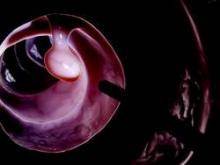Risk of interval colorectal cancer (CRC) more than doubled when average withdrawal times during routine colonoscopy were less than 6 minutes, investigators reported in the October issue of Gastroenterology.
The results reinforce current guidelines that set a withdrawal time of at least 6 minutes as a quality indicator for screening colonoscopy, said Dr. Aasma Shaukat at the Minneapolis Veterans Affairs Health Care System and her associates. “Focusing quality-improvement efforts on withdrawal time [less] than 6 minutes would likely have the most impact,” although rates of interval CRC were “lowest and relatively constant” when withdrawal times were at least 8 minutes, the investigators said.
Short scope withdrawal times are known to decrease adenoma detection rates, but their impact on risk of interval CRC had not been examined before, the investigators said. Their retrospective, multicenter, community-based study included 76,810 colonoscopies performed by 51 endoscopists in and near Minneapolis and St. Paul between 2004 and 2009. Follow-up time was 5.5 years or until cancer diagnosis (Gastroenterology 2015 June 5 [doi: 10.1053/j.gastro.2015.06.001]) .
Patients of endoscopists whose withdrawal times averaged less than 6 minutes had a 2.3-fold higher rate of interval CRC, compared with patients whose physicians took at least 6 minutes to withdraw the scope (incidence rate ratio, 2.3; 95% confidence interval, 1.5-3.4; P less than .0001), even after they had accounted for age, sex, and quality of preparation for colonoscopy, the researchers reported. Every extra minute of withdrawal time also led to a 3.6% rise in the chances of detecting an adenoma (95% CI, 2.4%-4.8%; P less than .0001). Physicians whose adenoma detection rates averaged at least 25% had somewhat lower interval CRC rates among their patients than did those whose adenoma detection rates (ADRs) were less than 25%, although the difference was not significant. Adjusting for ADRs also did not alter the link between withdrawal time and risk of interval CRC, but restricting the analysis to 2007 and later weakened the association slightly (IRR, 2.0; 95% CI; 1.0-3.9; P = .04). Finally, patients who were aged 60-69 years had interval CRCs almost three times more often than did younger patients, and patients who were at least 70 years old had 6.2 times the frequency of interval CRCs, compared with the youngest age group, the investigators reported.The researchers designed the study around the 6-minute withdrawal time threshold because of current guidelines but found “no obvious cut point for defining poor quality for screening colonoscopies,” they said. Although the patient sample represented the community-based target population for screening programs, the study had some limitations, the investigators added. For example, they used 2007 withdrawal times for the years 2004-2006 because they lacked data for those years, and as a result, they could have overestimated the association between withdrawal time and risk of interval CRC, they said. They also would have missed any cancer cases diagnosed in other states and could not distinguish between cancers diagnosed because of symptoms and those that were first detected on screening colonoscopy, they noted.
A Veterans Affairs Career Development program and the Center for Chronic Disease Outcomes Research funded the study. The authors reported having no conflicts of interest.


